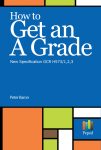Specification H573/3 Knowledge of God
January 9, 2018
 Here is the OCR specification with hyperlinks applied to make it easy for you to resource the suggested reading. Scroll down and you will find my comments designed to help you understand the key issues in this part of the specification, and how they relate to other two papers, or other parts of Christian Thought. If you wish to understand fully how the specification hangs together, then try my new book – How to Get an A Grade, where I analyse the specification in microscopic detail….available in the peped shop with our new study guides for each paper. Finally, if you need a tutor, we now have tutors available at a fair hourly rate. Just email me for details, peterbaron@peped.org.
Here is the OCR specification with hyperlinks applied to make it easy for you to resource the suggested reading. Scroll down and you will find my comments designed to help you understand the key issues in this part of the specification, and how they relate to other two papers, or other parts of Christian Thought. If you wish to understand fully how the specification hangs together, then try my new book – How to Get an A Grade, where I analyse the specification in microscopic detail….available in the peped shop with our new study guides for each paper. Finally, if you need a tutor, we now have tutors available at a fair hourly rate. Just email me for details, peterbaron@peped.org.
2. Foundation: Knowledge of God’s Existence
The origins and development of Christianity, and the sources of wisdom on which it is based.
2.1 Content
• Natural knowledge of God’s existence:
– as an innate human sense of the divine
– as seen in the order of creation
• Revealed knowledge of God’s existence:
– through faith and God’s grace
– revealed knowledge of God in Jesus Christ
2.2 Knowledge
• as all humans are made in God’s image they have an inbuilt capacity and desire to know God,
including:
– human openness to beauty and goodness as aspects of God
– human intellectual ability to reflect on and recognise God’s existence
• what can be known of God can be seen in the apparent design and purpose of nature
• as humans are sinful and have finite minds, natural knowledge is not sufficient to gain full
knowledge of God; knowledge of God is possible through:
– faith
– grace as God’s gift of knowledge of himself through the Holy Spirit
• full and perfect knowledge of God is revealed in the person of Jesus Christ and through:
– the life of the Church
– the Bible
2.3 Issues as the basis of exam questions
• whether or not God can be known through reason alone
• whether or not faith is sufficient reason for belief in God’s existence
• whether or not the Fall has completely removed all natural human knowledge of God
• whether or not natural knowledge of God is the same as revealed knowledge of God
• whether or not belief in God’s existence is sufficient to put one’s trust in him
2.4 Suggested scholarly views, academic approaches and sources of wisdom and authority
Learners will be given credit for referring to any appropriate scholarly views, academic
approaches and sources of wisdom and authority, however the following examples may
prove useful:
• Romans 1:18–21
• Calvin, J. Institutes of the Christian Religion I.I and I.II
• Acts 17:16–34






0 Comments